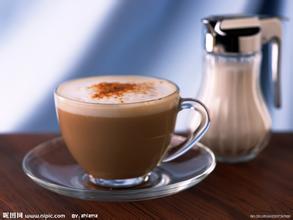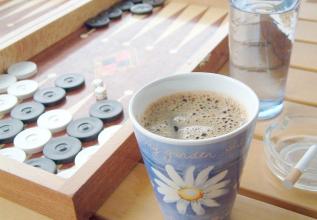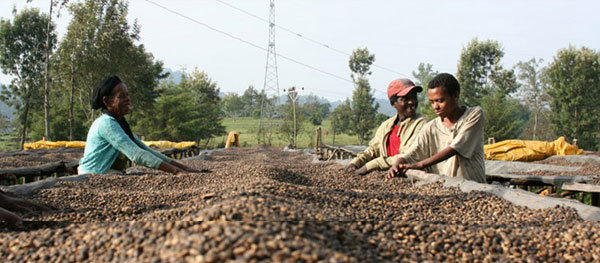Introduction to the taste characteristics of Indonesia Manning Fine Coffee Bean Manor with very strong flavor
In July 2004, Indonesia held its first direct presidential election in history. Former Minister of political Security Susilo Bambang Yudhoyono and Minister of people's Welfare Coordination Muhammad Jusuf Kalla won two rounds of direct elections and were sworn in as president and vice president on October 20, 2004.
In August 2005, the Indonesian government reached a peace agreement with the separatist group Aceh Independence Movement. In July 2006, the Indonesian Congress passed the Aceh Management Law. In December 2006, Aceh held local elections, and former leaders of the "Asian independence movement", Irvandi Yusuf (Irwandi Yusuf) and Mohamed Nazar (Muhammad Nazar), were elected governors and vice governors. In April 2012, former leaders of the Aceh Independence Army, Zaini Abdullah and Muzakir Manaf, were elected governors and vice governors for a term of office until 2017.
In July 2006, the Indonesian Parliament passed the new nationality Law, which removes some elements of racial discrimination and gender discrimination. In October 2008, the Indonesian Parliament passed the Law on the Elimination of racial Discrimination, Medan is the capital of North Sumatra province, with an urban area of 342 square meters and a population of about 1.8 million, making it the third largest city in Indonesia. Bordering the Strait of Malacca, it is the west gate of Indonesia's foreign trade and one of the main entry and exit ports for domestic and foreign tourists. The establishment of the economic growth triangle in Indonesia, Malaysia and Thailand has strengthened its position as the development center of Jiangsu Province and northern Indonesia. it has promoted the rapid development of the city's small industries such as food processing, textile industry, leather goods, chemical industry, building materials, metals and means of transportation. The city has a clean appearance, shady trees and a pleasant climate. The Sultan Palace in the city was built in 1888, according to the Indonesian Ministry of Energy and Mines (2013), Indonesia's coal reserves are about 58 billion tons, with proven reserves of 19.3 billion tons, of which 5.4 billion tons are commercially exploitable reserves. As there are still many areas with unproven reserves, the Indonesian government estimates that the total coal reserves will reach more than 90 billion tons. Indonesia has huge natural gas reserves, about 123,589 trillion cubic meters (equivalent to 20.6 billion barrels of oil), of which 2423 trillion cubic meters have been proved, mainly produced in Allen in Sumatra and Badak in East Kalimantan. Indonesia has nickel reserves of more than 5.6 million tons, ranking first in the world. Diamond reserves are about 1.5 million carats, ranking first in Asia. In addition, uranium, town, copper, Ming, bauxite, Zhong and other reserves are also very rich.
Asia is the main destination for Indonesia's coal exports, accounting for more than 70% of the total, followed by Europe and the Americas. The main export targets in Asia are India, Japan, China and so on. Indonesian coal exports to China reached 42.9 million tons in 2010, making it a major coal source in parts of southern China.
Manning is not the name of the producing area, the place name, the port name, nor the name of the coffee breed. How did it get its name?
In fact, it is a phonetic error of the mandheling people in Mandaining, Indonesia.
During the Japanese occupation of Indonesia during World War II, a Japanese soldier drank mellow coffee in a cafe, so he asked the shopkeeper the name of the coffee, and the boss mistook him for asking where you were from, so he replied: Mandaining. After the war, the Japanese soldiers recalled the "manning" they had drunk in Indonesia. As a result, 15 tons of Indonesian coffee was transported to Japan, which was very popular. That's how Manning's name came out, and the coffee merchant is now the famous PWN Coffee Company.
Known as Mantenin mandheling, it is produced all over Lake Toba in northern Sumatra. The finished product has a unique fragrance of herbs and trees.
Gold manning, the Japanese adopted more stringent quality control more than a decade ago. After picking beans manually for four times, they eliminated defective beans and produced gold mantenin with dark green color and equal appearance of beans, creating another wave of market demand. Even Europe and the United States are crazy about Mantenin coffee: Manning coffee is produced in Sumatra, Indonesia, Asia, also known as "Sumatran coffee." Her flavor is very rich, fragrant, bitter, mellow, with a little sweetness. Most coffee lovers drink on their own, but it is also an indispensable variety for blending coffee.
At a time when Blue Mountain had not yet been made public, Manning coffee was considered to be the best product in the world. after baking, the beans were very large, raw beans were brown or dark green, caramel-like special flavor, mellow taste, sweet and bitter without soft acidity, but bitter taste. The production volume is relatively small, so the price is slightly higher than the general coffee beans.
Manning Coffee is produced in Sumatra, Indonesia, Asia, also known as "Sumatran Coffee". The main producing areas are Java, Sulawesi and Sumatra, 90% of which are Robusta species. Among them, the "Mantelin" produced in Sumatra is the most famous. The best of the exquisite traditional Arabica coffee produced in northern Sumatra of Sumatra is sold as Lindong Lintong and Manning Mandheling. To be exact, Lindong Lintong refers to coffee growing in a small area in the southwest of Lake Toba in Lindong District. The small coffee growing area is scattered on a high and wavy clay plateau full of fern covers. Lintong Lindong coffee is grown without shade, does not use chemicals, and is almost entirely owned by small private owners.

Important Notice :
前街咖啡 FrontStreet Coffee has moved to new addredd:
FrontStreet Coffee Address: 315,Donghua East Road,GuangZhou
Tel:020 38364473
- Prev

Introduction to the characteristics of Panamanian Fine Coffee Bean Flavor and Manor
Panama is located in the isthmus of Panama in Central America, bordered by Colombia to the east, the Pacific Ocean to the south, the map of Panama to Costa Rica to the west and the Caribbean Sea to the north. The territory is S-shaped to connect North and South America, and the Panama Canal connects the Atlantic and Pacific oceans from north to south. It is known as the bridge of the world. [5] Panama has a land area of 75517 square kilometers.
- Next

Banchi Maggie Coffee with Fruit Flavor Variety characteristics of Fine Coffee beans in Manor
Bench Maji, located in southwestern Ethiopia and not far from neighboring Sudan, is easy to find using Google map. Although the flavor of Banchimaji Gesha Estate is different from that of Panamanian Geisha, it is still worth tasting. It is rare in many regions of Ethiopia, because of its varied flavor of spices and fruits.
Related
- Detailed explanation of Jadeite planting Land in Panamanian Jadeite Manor introduction to the grading system of Jadeite competitive bidding, Red bid, Green bid and Rose Summer
- Story of Coffee planting in Brenka region of Costa Rica Stonehenge Manor anaerobic heavy honey treatment of flavor mouth
- What's on the barrel of Blue Mountain Coffee beans?
- Can American coffee also pull flowers? How to use hot American style to pull out a good-looking pattern?
- Can you make a cold extract with coffee beans? What is the right proportion for cold-extracted coffee formula?
- Indonesian PWN Gold Mandrine Coffee Origin Features Flavor How to Chong? Mandolin coffee is American.
- A brief introduction to the flavor characteristics of Brazilian yellow bourbon coffee beans
- What is the effect of different water quality on the flavor of cold-extracted coffee? What kind of water is best for brewing coffee?
- Why do you think of Rose Summer whenever you mention Panamanian coffee?
- Introduction to the characteristics of authentic blue mountain coffee bean producing areas? What is the CIB Coffee Authority in Jamaica?

